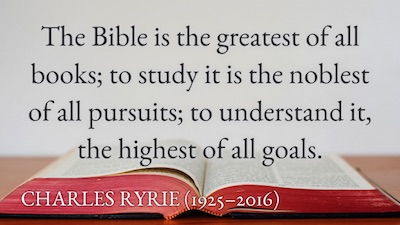Comple-galitarian?
“Though women are free to use all of their giftedness in teaching and leading in the church, the role of elder seems biblically to be relegated to men.”
This statement is the conclusion of a Dallas-area church that has long had a reputation for holding fast to the Word. It also represents what many other Bible-teaching churches have decided. And I think it’s worth discussing here not because of the conclusion they reached, but because of what it has revealed (again) about the dynamic of discussions within the church. We use the most astonishing rhetoric when we disagree!
Look at the statement again. Interpretation: a woman may stand behind the pulpit on Sunday morning, but she may not serve on the elder board. Now, let me say from the start that I have no intention of commenting on this church’s actual decision. Others have done plenty of that. What I am far more interested in doing here is providing commentary on the commentary.
First, some have labeled the decision to allow for women’s preaching as an “inerrancy” issue rather than an “interpretation/ hermeneutics” issue. As a result we hear smears such as “liberal” applied, which suggests that those who have drawn such conclusions take a low view of holy writ. (Surely we can say, can’t we, that even egalitarian scholars such as Roger Nicole, F. F. Bruce, Gordon Fee, and Craig Keener, take a high enough view of Scripture?) We must give each other the benefit of the doubt that a) those seeing in the biblical text less freedom for women are not necessarily doing so because they want to “keep women down” and b) those seeing in the biblical text more freedom for women are not necessarily doing so because they’re driven by a radical feminist agenda. Can’t we show some Christian charity and assume everybody has pure motives unless proven otherwise?
Next, the decision to allow women publicly to teach has been described by some as “egalitarian.” Yet to the egalitarian mind, a decision to go with an all-male board is sort of equivalent to a Civil Rights leader allowing blacks to speak as long as they do so under the authority of whites. Just because something is a move toward more freedom does not make it egalitarian. The statement above is a complementarian conclusion that no egalitarian would embrace. Such assessments of the statement demonstrate wide differences within the complementarian camp.
Some will allow women to preach but not serve as pastors or elders. Some will not allow them to be preachers. I know of one who would allow women to be elders but not senior pastors. Others place the authority line only within the marriage relationship. All complementarians draw a line, but we see some variety in where they draw it. And sadly each group seems to get a different set of friends and enemies every time they do.
Another (and secondary) error made by those on the more conservative end is to blame women’s speaking on American cultural trends started by feminist leader Betty Friedan. In doing so…
- They show a relative ignorance of global Christianity. For example, in the house churches of China “women in particular have been the dominant leaders. Arthur Glasser emphasizes how the modeling by missionary women played a significant part in the survival of Christianity under Communism, and asserts that 85 percent of the pastoral leaders of China’s house churches are women” (Frances Hiebert, “Missionary Women as Models in the Cross-Cultural Context” Missiology l0:4 [1982], 459–460). And then there’s Cuba. Same deal. Also Africa. American evangelicals have often said female leadership is okay because the church really needs these people. When it grows strong enough to have only male leaders, it will change. But the African church is arguably stronger in many places than in North America.
- They fail to own their own heritage of evangelicals who served on the front lines of advocating for women (think: Sunday schools instituted when the culture at large thought women didn’t need educatin’). Things actually got more conservative among many Bible-believers after Betty Friedan came along, probably as a reaction against women’s lib. Have you seen the footage in “Beyond the Gates of Splendor” of Rachel Saint in the 1950’s teaching men doctrine? A past president of Dallas Theological Seminary told me in a private interview that Dr. Lewis Sperry Chafer, one of the school’s founders, invited a woman, “Mrs. Tan,” to speak in chapel there when this former president was a student. I don’t know the exact year that happened, but Dr. Chafer died in 1952—eleven years before Ms. Betty released The Feminine Mystique. And Moody Bible Institute, a vanguard of evangelicalism and inerrancy, trained women for ordained pastoral ministry in the 1920’s.
So here’s my point: The debate surrounding such decisions is not complementarian vs. egalitarian but complementarian (no female preaching) vs. complementarian (preaching okay as long as under male authority). Nor is it a liberal/inerrancy debate. Rather, it is a conversation (at best) among those committed to the authority and inspiration of Scripture. Describing it in less generous terms only demonstrates our ignorance of the fact that within the complementarian camp lie a wide range of views all of which see some degree of male authority.



13 Comments
Heather A. Goodman
Very well thought out and
Very well thought out and articulated post. Thank you for challenging us to think gracefully about our fellow Christians rather than assuming the worst.
Sandra Glahn
Thanks
I appreciate your kind words a lot.
Terri Moore
What a good analysis of the
What a good analysis of the situation and refreshingly level-headed! I think your final paragraph is an especially good reminder and summary. Thanks, Sandy.
Kay Daigle
Great job
Thank you, Sandi, for expressing what has been disturbing me about the issue for a very long time, but particularly in recent days as the conflict has brewed up in the Dallas area. It has bothered me that we redefine each other by using terms that are not applicable, and in doing so, create straw men to destroy. I hope that as the dialogue continues, we will all be careful not to use terminology that is designed to create emotional responses rather than well-considered argument. Personally, I think the way many have characterized those with whom they disagree and the tone of their comments must hurt God greatly when He says that it’s our unity that reveals Him to the world. We don’t have to agree on the issue but we must express the other side honestly and converse with love.
Sharifa Stevens
Thank you for revisiting –
Thank you for revisiting – and also defining
bleek
is that all?
if I know you well enough (risky assumption), I would guess that although you sincerely appreciate the words of encouragement, you also desire some engagement. thus…
is your only point to point out that evangelicals don’t get the point…about the conversation? you clarify that you wish only to comment on the commentary, but you offer such an extensive treatment of the issue (not just the commentary) that it appears you (unconsciously?) aim to argue for more. I will not claim to know what that is, but I feel it’s there.
yes?
Sandra Glahn
Yeah, That’s Pretty Much All
You’re right that I welcome engagement/interaction. I would love to see a cordial lively discussion arise from this.
But I’m actually not (as you say–consciously–at least)
bleek
ok, I buy it
I trust ya that you were limiting the post to commentary – true that you set method aside for the time being. case closed.
but…since you opened it up 🙂 would you suggest that we can make a clean division between method and bibliology? certainly, a gracious and generous dialogue is called for, regardless, but I would argue that we all come to the table with “preconditions” (anyone watch the debates?) I know you would argue the same (I think).
I would see the tangle precisely on this point – my method is inextricably linked to my bibliology. granted, hopefully method has the upper hand in articulating theology, but ultimately not in my view of what Scripture is. and, what I believe Scripture is very much sways my method.
this places culture back on the table.
(for those who may not know me, don’t assume you know where my mind or heart is headed…you might be surprised :-0
Sandra Glahn
Can’t Lose Bias
I do totally agree that we all bring our biases to the table. For that reason I see no harm in saying something like "The new ESV Study Bible was produced by an all-male, all-complementarian
bleek
preach!
(oh, did I say that?)
Ok, your clarification helps. on both levels. we must “confess” our presuppositions and biases, or the conversation simply spins yarn. also, we must LISTEN to people before assuming they are going to say or think a certain thing. some people will surprise us, even if many don’t.
so, to your original post – this connects well. I’m glad you shared more. assuming that anything other than “barefoot and pregnant” = egalitarian is not only unhelpful, it’s ignorant (and offensive…and I’m a man).
Sandra Glahn
LOL
"Preach it" back atcha. Rock on, brother!
Heather A. Goodman
Honestly, I think I learned
Honestly, I think I learned as much (if not more) theology from my missions and cultural anthropology classes and studies than systematic studies (which is saying a lot considering how much I learned in systematics). Studying cultural anthropology opened my eyes to exactly what you mention–our biases, preconceptions, and assumptions.
Gwynne Johnson
More heat than light?
This old phrase, more heat than light, does tend to prevail in this issue. Thanks, Sandi, for calling for respectful conversation and extending grace to one another.